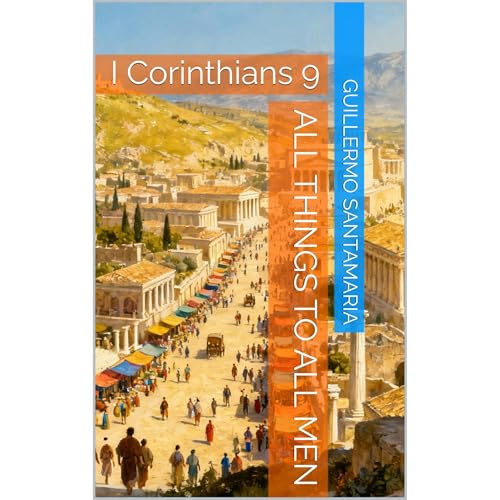
ALL THINGS TO ALL MEN
No se pudo agregar al carrito
Add to Cart failed.
Error al Agregar a Lista de Deseos.
Error al eliminar de la lista de deseos.
Error al añadir a tu biblioteca
Error al seguir el podcast
Error al dejar de seguir el podcast
Compra ahora por $3.99
-
Narrado por:
-
Virtual Voice

Este título utiliza narración de voz virtual
The book explores Paul’s statement in 1 Corinthians 9:22, “I have become all things to all men,” by beginning with a close Greek analysis of the verse. It explains that phrases like “τοῖς πᾶσιν γέγονα πάντα” (“I have become all things to all”) and “ἵνα πάντως τινὰς σώσω” (“so that by all means I might save some”) emphasize Paul’s radical willingness to adapt himself—in every ethically permissible way—for the salvation of others. This does not mean compromising doctrine or morals, but laying aside personal rights, altering lifestyle, idiom, and cultural approach so that the gospel may be heard without unnecessary offense.
From there, the paper zooms out into the social and religious world of Corinth. It portrays Corinth as a hyper-diverse, status-obsessed port city filled with Greeks, Romans, Jews, slaves and freedmen, and shaped by Stoicism, Epicureanism, Platonism, sophistic rhetoric, mystery religions, and robust pagan worship—especially the cult of Aphrodite. It describes the famous (and debated) reports of “sacred prostitution,” noting that even if ancient claims were exaggerated, Corinth clearly had a reputation for sexualized religion and moral looseness. This environment forms the backdrop for Paul’s sharp teaching on holiness and sexual purity, and for his insistence that the church not mirror Corinth’s vices.
The document also highlights the sharp economic and social stratification in Corinth. Archaeological and textual evidence point to wealthy patrons, officials, and merchants alongside the poor, slaves, and day laborers. Within the church itself, this produced tensions: abuses at the Lord’s Supper where the rich feasted while the poor went hungry, lawsuits among believers, and status-driven conflicts over spiritual gifts. Paul’s ministry model—“becoming all things to all men”—is then traced through concrete examples: circumcising Timothy but refusing to circumcise Titus, keeping Jewish customs among Jews, living like a Gentile among Gentiles, and surrendering his liberties for the sake of “the weak.” The overall conclusion is that in a fragmented, morally chaotic, and class-divided Corinth, Paul practiced a deliberate, sacrificial cultural flexibility. He adjusted his conduct and methods to different groups, not to please people or blur truth, but to remove avoidable stumbling blocks so that Christ might be clearly proclaimed and some truly saved.

